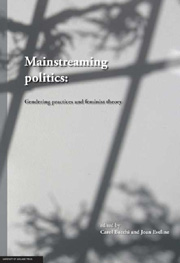Book contents
- Frontmatter
- Contents
- Preface
- Personal reflection
- Publisher's note
- List of authors and project personnel
- Acknowledgements
- Introduction
- 1 Gender/ing impact assessment: Can it be made to work?
- 2 Mainstreaming and neoliberalism: A contested relationship
- 3 Gender analysis and social change: Testing the water
- 4 What are we mainstreaming when we mainstream gender?
- 5 Approaches to gender mainstreaming: What's the problem represented to be?
- 6 Power, resistance and reflexive practice
- 7 Gender mainstreaming: The answer to the gender pay gap?
- 8 Gender analysis and community participation: The role of women's policy units
- 9 The invisibility of gendered power relations in domestic violence policy
- 10 Gender mainstreaming versus diversity mainstreaming: Methodology as emancipatory politics
- 11 University-public sector research collaboration: Mine the space, never mind the gap
- 12 Obeying organisational ‘rules of relevance’: Gender analysis of policy
- 13 Gender mainstreaming or diversity mainstreaming? The politics of ‘doing’
- Conclusion A politics of movement
- Author Index
- General Index
10 - Gender mainstreaming versus diversity mainstreaming: Methodology as emancipatory politics
Published online by Cambridge University Press: 05 June 2012
- Frontmatter
- Contents
- Preface
- Personal reflection
- Publisher's note
- List of authors and project personnel
- Acknowledgements
- Introduction
- 1 Gender/ing impact assessment: Can it be made to work?
- 2 Mainstreaming and neoliberalism: A contested relationship
- 3 Gender analysis and social change: Testing the water
- 4 What are we mainstreaming when we mainstream gender?
- 5 Approaches to gender mainstreaming: What's the problem represented to be?
- 6 Power, resistance and reflexive practice
- 7 Gender mainstreaming: The answer to the gender pay gap?
- 8 Gender analysis and community participation: The role of women's policy units
- 9 The invisibility of gendered power relations in domestic violence policy
- 10 Gender mainstreaming versus diversity mainstreaming: Methodology as emancipatory politics
- 11 University-public sector research collaboration: Mine the space, never mind the gap
- 12 Obeying organisational ‘rules of relevance’: Gender analysis of policy
- 13 Gender mainstreaming or diversity mainstreaming? The politics of ‘doing’
- Conclusion A politics of movement
- Author Index
- General Index
Summary
Introduction: Joan Eveline and Carol Bacchi
The gender analysis project gathered pace in its last few months. Developments that are noted briefly in earlier chapters, such as the topic of this chapter, the Indigenous Electoral Strategy (Chapter 3), and the inclusion of ‘cultural analysis’ in SAGA (South Australian Gender Analysis; Chapter 3) acquired their full significance as we began to reflect on the project as a whole and on what we had learned (on SAGA and ‘cultural analysis’, see Chapter 13). We also began to reflect critically on the relative ‘success’ of the project and more broadly on how change occurs, or fails to occur (Chapters 11 and 12). In tune with the perspective developed in this book, our contributions on these topics represent our current thinking about the complex interactions we have studied.
In analysing the Indigenous Electoral Strategy, the chapter discusses further the issue raised in Chapter 9, that any understanding of gender used in our policies incorporates a particular cultural base. Arguments for ‘gender mainstreaming’, for example, rest on the assumption that highlighting ‘gender’ as the primary category will have similar effects in differing cultures, a contentious claim, as we proceed to discuss.
The chapter examines a Western Australian project in which Aboriginal policymakers challenged this supposition of cultural neutrality. They argued that the understanding of gender used in western societies has privileged white women's interests over those of Aboriginal people. Consequently, they refused ‘gender equity’ as a term to use in their project of increasing Indigenous participation in local government.
- Type
- Chapter
- Information
- Mainstreaming PoliticsGendering Practices and Feminist Theory, pp. 237 - 262Publisher: The University of Adelaide PressPrint publication year: 2010



